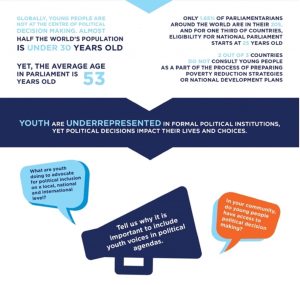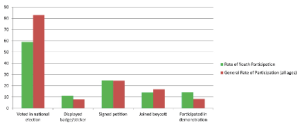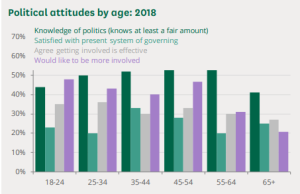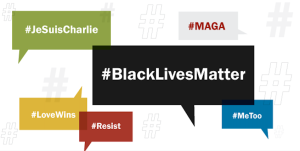___________________________
YOUTH POLITICAL PARTICIPATION: REINVENTING POLITICAL ACTIVISM
Over the last three years, the global pandemic has changed the way the world functions in many regards. As citizens across the globe were forced into lockdown, social media became the primary form of social interaction and communication. Not only was social media used as a tool to engage with others socially but has changed the way the youth of society participate in political life.
Political engagement has been an ongoing issue with the youth of society. Voter turnout among 18-25-year-olds continues to be the lowest than any other age group around the world (UNDP 2023). According to the United Nations Development Programme (Figure 1), the youth are continually underrepresented in formal political institutions, despite political decisions impacting their lives and choices.

Not only do these statistics suggest that young people are politically disengaged, but the youth are often described as disillusioned, apathetic and uninterested in politics (Keating & Melis 2007).
Do you agree?
I think that the increasing use of unconventional forms of political participation by the youth of society begs to differ. Young people are not uninterested nor apathetic but have reinvented the meaning of political engagement by participating in different ways. The younger generation engage via social media, protests and petitioning (Sloam 2016). As the largest consumers of social media, young people are increasingly using social media platforms to access and spread political information (Marquart et al 2020). Additionally, youth are more likely to engage in issue-based politics or protest politics than electoral politics, compared with the participation of all other age groups (Figure 2).

The style of political participation of young peoples are not greatly recognised by formal political institutions, hence the common misconception that young people are disengaged. The Audit of Political Engagement (2019) conducted by the Hansard Society (Figure 3) actually demonstrates high levels of willingness amongst young people to engage in politics, imperative to an optimistic future whereby the youth are just as politically engaged as the rest of society.

The most common form of unconventional political participation undertaken by young people is engaging with social media and online platforms (Figure 4). Statistics show that young people, more than ever, turn to social media to consume and produce political content, with 70% of young people having received their political information about the 2020 US election via social media (Circle 2020).

Have you ever re-tweeted or shared a post to your Instagram story about politics?
The easiest way for young people to spread awareness and draw attention to specific political events and issues online is through naming and shaming via #Hashtag Activism. This form of political activism has become very popular recently, for example the Black Lives Matter Movement gained a lot of traction through hashtag activism, specifically through the use of the tag lines ‘#BLM’ and ‘#BlackLivesMatter’. As a young person on social media, I can definitely say that online activism has helped expand my knowledge regarding social justice issues around the world especially the Black Lives Matter movement and the #MeToo movement.

Activism? Or “Slack-tivism”…
The youth of society have received backlash for engaging politically via social media, instead of using more traditional methods of political engagement. The term ‘Slacktivism’ refers to the idea that online participation such as signing an e-petition, or reposting messages online have no real impact, and instead are dangerous because the more fulfilled people are by engaging online, the less likely they are to get involved in ‘real activism’ (Dennis 2023). These concerns are valid as voting absenteeism of the youth of society is a real problem (Becker et al. 2017).
In the United Kingdom, a system that employs the liberal model of citizenship, formal traditional methods of engagement are the only ones that are heard and rewarded. Voting, the traditional method for political engagement is the most effective way to instigate political change, serving as an accessible mechanism for civic engagement to ensure that governmental policy reflects the demands of the public (Birch et al. 2013).
However, not all is to be said and done for social media political activism. By engaging in politics online, young people contribute to public accountability and increase awareness of various social, economic and political issues affecting different groups. As the world has become increasingly globalised and digitised, naming and shaming online proves to be an accessible and easy method for young people to get involved. The fact that politicians across the globe are spending millions of dollars on social media campaigning and advertising demonstrates the success of social media as a method of political engagement (Figure 6).
Figure 5: How effective is social media in Politics? Scripps News.
Where to next?
Social media is a great tool for accumulating soldiers but it is not the battle ground. Social media has an enormous impact to create awareness of various issues and is increasingly being rewarded as a successful mode of political participation. However, in a society that focuses on the vote as the ultimate tool to instigate political change, I encourage you to take your twitter posts to the polling booths!
Bibliography:
Becker, S. O., Fetzer, T., & Novy, D. (2017). Who voted for Brexit? A comprehensive district-level analysis. Economic Policy, 32(92), 601-650.
Birch, S., Glenn, G., & Lodge, G. (2013). Divided democracy: Political inequality in the UK and why it matters: IPPR.
Boothe et al. 2020. Young People Turn to Online Political Engagement During COVID-19 | CIRCLE. [ONLINE] Available at: https://circle.tufts.edu/latest-research/young-people-turn-online-political-engagement-during-covid-19 [Accessed 22 February 2023]
Dennis, J. 2023. What does social media mean for our politics? | University of Portsmouth. 2023. [ONLINE] Available at: https://www.port.ac.uk/news-events-and-blogs/features/what-does-social-media-mean-for-our-politics [Accessed 22 February 2023].
Horvath et al. 2023. Political Participations and EU Citizenship: Perceptions and Behaviours of Young People (EACEA) [ONLINE] Available at: https://ec.europa.eu/assets/eac/youth/policy/documents/perception-behaviours_en.pdf [Accessed 22 February 2023].
Keating, A. and Melis, G. (2017). Social Media and Youth Political Engagement: Preaching to the converted or prividing a new voice for youth?. The British Journal of Politics and International Relations, [online] 19(4), pp.877-894. Available at: https://doi.org/10.1177%2F1369148117718461 [Accessed 7 Feb. 2019].
Marquart, F., Ohme, J. and Möller, J. (2020) Following Politicians on Social Media: Effects for Political Information, Peer Communication and Youth Engagement. Media and Communication. 8(2) pp. 197-207. DOI: 10.17645/mac.v8i2.2764.
Monica Anderson. 2023. Activism in the Social Media Age | Pew Research Center. [ONLINE] Available at: https://www.pewresearch.org/internet/2018/07/11/activism-in-the-social-media-age/ [Accessed 22 February 2023].
Sloam, J. 2016. Diversity and voice: The political participation of young people in the European Union. The British Journal of Politics and International Relations, 18(3), 521–537. https://doi.org/10.1177/1369148116647176
United Nations Youth Envoy. 2023. Fast Facts: Civic Engagement and Participation of Youth in Politics and Public Institutions. [ONLINE] Available at: https://www.un.org/youthenvoy/political-participation/ [Accessed 22 February 2023].
